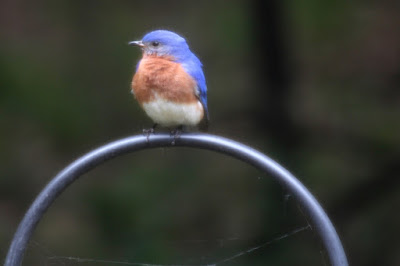 |
| bluebird of happiness?
Photo by J. Harrington
|
To be honest, I had come across Ginsberg's essay some time ago and kept meaning - to get around - to reading it. You know what they say about the road to hell being paved with good intentions? Well, this morning I repaved that road with action. I've now read the essay in its entirety. Ginsberg includes a number of extended quotations from Whitman's "Leaves." I struggle with what I read as Whitman's ornate style. Ted Kooser, Gary Snyder, Joy Harjo, and Mary Oliver are more to my liking. But, I also feel guilty, because of his stature among American poets, about not having read hardly any of Whitman, other than for school assignments years ago. Last Christmas I was given a copy of Leaves of Grass (The Death-bed Edition). This Summer I intend (there's that word again) to read all 700+ pages, if we get enough warm, dry weather to enable me to sit on the screen porch and enjoy some peace and quiet. Ginsberg's essay helps frame what has seemed a too daunting undertaking into a more coherent read. Seeing more and more similarities between many of the Beat writer's works, especially Ginsberg's Howl and Kerouac's On the Road, and Whitman's style is helping to ease my transition back through time to Whitman's own stream of consciousness.
 |
| oak leave clusters with rain
Photo by J. Harrington
|
I know I'm not the only one troubled by Whitman's style. Several years ago, in a writing class at the Loft Literary Center, a classmate became quite irate during a discussion of Whitman's work, with the phrasing of:
My classmate read the "assume" line as being dictatorially offensive, since he believed readers should be entitled each to his or her own assumptions about what a poem means. I may have done Mr. Whitman an equal disservice by equating his elegy for Lincoln, When Lilacs Last in the Dooryard Bloom'd, especially stanza 6, with Robert Kennedy's funeral train. Much of Whitman's poetry seems to foretell the trials and tribulations democracy continues to face. It also portrays the resilience with which both democracy and life continue. Don't just take my word for it. Go, read Ginsberg's essay. Even better, read Whitman yourself. Maybe we can compare notes after this Summer.And what I assume you shall assume,For every atom belonging to me as good belongs to you.
To the Oracle at Delphi
Great Oracle, why are you staring at me, do I baffle you, do I make you despair? I, Americus, the American, wrought from the dark in my mother long ago, from the dark of ancient Europa-- Why are you staring at me now in the dusk of our civilization-- Why are you staring at me as if I were America itself the new Empire vaster than any in ancient days with its electronic highways carrying its corporate monoculture around the world And English the Latin of our days-- Great Oracle, sleeping through the centuries, Awaken now at last And tell us how to save us from ourselves and how to survive our own rulers who would make a plutocracy of our democracy in the Great Divide between the rich and the poor in whom Walt Whitman heard America singing O long-silent Sybil, you of the winged dreams, Speak out from your temple of light as the serious constellations with Greek names still stare down on us as a lighthouse moves its megaphone over the sea Speak out and shine upon us the sea-light of Greece the diamond light of Greece Far-seeing Sybil, forever hidden, Come out of your cave at last And speak to us in the poet’s voice the voice of the fourth person singular the voice of the inscrutable future the voice of the people mixed with a wild soft laughter-- And give us new dreams to dream, Give us new myths to live by!
Read at Delphi, Greece, on March 21, 2001 at the UNESCO World Poetry Day
********************************************
Thanks for visiting. Come again when you can.
Please be kind to each other while you can.
No comments:
Post a Comment